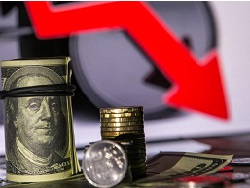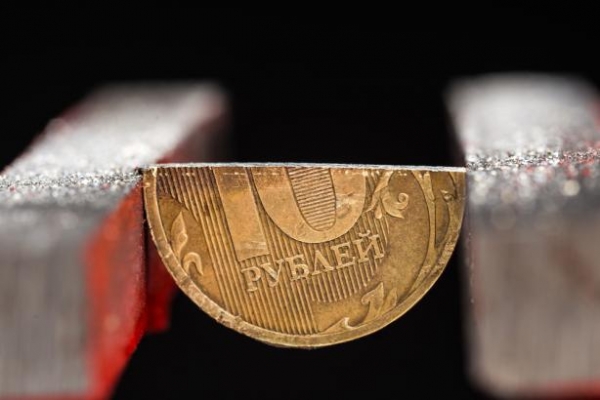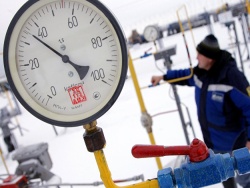
The Finance Ministry is thinking over the actions at 30 dollars per barrel of oil.
The government is preparing a “stress” scenario if oil prices fall to $ 30 a barrel and survive long at this level. “There is a stress scenario in which oil will be in the region of 30 a long time”, — said the Deputy Minister of Finance Maxim Oreshkin at the world economic forum, reports TASS.
Now the government’s plan for the future built on the basis of the fact that the price ranges from 40 to 50. Although a long-term strategy, the Cabinet of Ministers develops, based on the best expectations. As reported by “Vedomosti” with reference to its sources, officials plan to reduce the budget 2017-19 years at a price of 50-55 dollars.
Of course, hope for the best always correct. But to predict the price of “black gold” is extremely difficult. And a lot of prerequisites to ensure that the price will fall. In particular, slowing economic growth in China, a market with its raw material coming out of Iran. Therefore, planning at low prices is not unreasonable.
Another thing, what exactly is meant by “stress scenario”, which says Maxim Oreshkin.
Every year for many years, the top leaders of the country talking about the need for structural reforms in order to save the economy from dependence on raw materials. Sometimes even talking about the successes in the development of agriculture and industrial import substitution. If the successes are real, the drop in oil prices is not so scary for us. But there are fears that even in the case of falling prices the economic block of the government will focus its efforts on the expectation that a barrel of oil will ever cost is still $ 100.
And to those “blessed” days, the government is likely to shift all burdens on the shoulders of citizens. Not by chance this week the information appeared that the Ministry of Finance is preparing a tax increase value added and on income of natural persons. Among other measures, even the input of the excise tax on sweet drinks…
Professor of economic policy, St Petersburg state University Gennady Alpatov believes that citizens should be prepared to tighten the belt:
— To understand the impact of low oil price on the budget, one must know the principle of operation of our economy. We sell oil for dollars, and social obligations of the budget is denominated in rubles. We are witnessing a kind of self-deception. Major oil exporters get dollars and pay taxes in rubles. Here this transition is equivalent to the fact that we just took and printed rubles for dollars received.
If the proceeds of dollars was distributed among the citizens, it would be a different conversation. But the currency is in the Bank. And in the end, we received an unsecured ruble mass. Product, that is oil, went abroad, and in exchange, we received only obligations of another country. What are the obligations? The obligation to deliver the goods. But we don’t get the goods and change dollars for rubles and pay their pensions.
It turns out that we print unsecured ruble. So let yourself not to cheat and just print rubles as needed. By the way, the inflation rate will be about the same. Said another Milton Friedman and John Keynes.
Simply put, not so scary decline in oil prices. We just have fewer dollars. But the government can still print rubles. So there is a solution.
If to speak about reality, then we can expect the reduction of social obligations of the state. We see how frozen pensions.
As for the private sector, the impact of the oil prices will be almost imperceptible. It is necessary to create a normal judicial system which would protect ownership rights. People are active, the economy will grow.
“SP”: — That is, it is expected to fill the “holes” at the expense of ordinary citizens?
— So. Will increase taxes. Likely to limit the expenditure items in the budget. And it is not our invention, and General practice. For example, did so in Greece. The main requirement for this country was to cut costs. Cyprus withdrew 10% of loans. Other ways to get there.
“SP”: — But we constantly hear of the departure of the economy from dependence on raw materials.
— It is necessary to give people the opportunity to do business without fear that the business will take. It is necessary to give freedom to the business, and he will bring additional income to the state budget. It’s pretty simple.
In the end, there is no other way of development, as the development of its own production. You can manipulate the finances and taxes, but the main question is, does something of the country? The government should solve this problem as soon as possible. Even Adam Smith said: “Calm and reasonable taxes.” By and large, businesses don’t have to.
While in the future, we can expect deterioration in the lives of those associated with the state budget. Someone is not connected, that will not be worse. Unless, of course, will not impose additional business taxes and not destroy all activity.
— At an oil price of 30 dollars per barrel, the economy will experience serious difficulties. If low prices will last long, you will have to cut costs and possibly to carry out structural reforms, ” says a senior lecturer at the Department of Economics and Finance, Ranepa Boris Brewer.
— Honestly, I have no idea how the Finance Ministry is going to plan a budget when the price of oil, even the budget will be in deficit. Will be needed reforms in all spheres, including education, healthcare and the army.
“SP”: — Do the budget so dependent on selling raw materials?
— If you take the averages, approximately 45% of the budget depends on oil and 10% gas. It turns out, about half of the budget form oil and gas revenues, the rest is income from other sectors. Accordingly, there is a big difference, to gain $ 100 per barrel or 30.
Of course, we have our own production. The most actively developing agriculture. But as the experience of many countries, the value added give science, production, services. Can all the fields to sow, to harvest, but the added cost is not much. In General, it is difficult to remember that the agrarian countries have achieved great success and stood on a par with developed.
Therefore oil and gas are the dominant sectors. There are sectors which are developing rapidly, for example, IT-sphere. But their contribution to the economy is so small it is akin to the statistical error. With all the beautiful slogans of oil is our main source of income.
“SP”: — Adapted if our economy and system of public administration for structural reforms?
— We are always talking about structural reforms. It is clear that while there was a high price of oil, reform no one wanted to start. Because it is always associated with big changes, unpopular, difficult to perceive the society and reflects poorly on the rating authority.
But today, the situation is not conducive to delay further reforms. The more you tighten, the worse it gets. The new State Duma, regardless of loss of image, you will have to accept reform. Otherwise the budget is so unbalanced that we’ll go into huge debt. External borrowing due to the sanctions is limited. But it is unclear how to compensate for the losses due to internal sources. Incomes fell, many companies are experiencing problems.
So no reform in any way. You can recall the pension system. You can recall the state property, today seven of ten companies with state participation. Time has passed, you will have to catch up.
Of course, the reforms will be painful, it will be bad for everyone — citizens and businesses. The tightening will occur in all directions.
It is worth considering that we usually have all the reforms one-sided, that is, in the direction of tightening and without regard for the possible consequences. If we want to effect change, it is necessary to conduct a comprehensive reform, involving all sectors and stakeholders relations.
By raising taxes and putting restrictions, you can only solve some short term problem. Here are already discussing a tax on sugary drinks. It’s all meaningless things. No it is not a reform, but a search of cents at the bottom of the barrel. It is necessary to change the structure of the allocation of public funds, improve the system of state orders.
In Russia now, given the fact that a new generation that thinks differently, it is possible to conduct a comprehensive reform. But I’m not sure that the current government is ready. And not what the Cabinet does not know how to do it, rather, he is mentally not ready for a big change.
In my opinion, if the Duma will change the composition, it can become the initiator of structural change, but not our government.
— Actually, it’s nothing from the fall in oil prices will not happen, — said the Professor of the Higher school of economy Ivan Rodionov.
We lived at a price of $ 17 and 12. People will live worse, but the decline in living standards will not be proportional, that is, when the price reduction from 50 to 25 the people are not poorer by half. But there is hope that the government will be more careful to spend money.
“SP”: — can Russia get rid of raw dependence?
— Greater dependence and no, it’s an illusion. In 2013, when everything was normal, the share of energy sector in GDP was about 9%.
In General, a bit strange, there are calls to get rid of oil dependence. Oil is a gift from God. What sense to refuse such a gift? The problem lies elsewhere. Over the past twenty years, the economy greatly simplified, but it is not so bad.
There are lots of countries that have no oil but they live quite well. And in Africa and Latin America there are countries rich in oil, which are poor.
So talk about a raw dependency is a good excuse. Just as the talk about structural reforms. All of them speak, but no one offered five or six steps that you could make and see the result.
Yet all the difficulties placed on the shoulders of citizens. But the problem is not the price of oil and not a lack of funds. You were not to hold the Olympics and not to build the bridge on island Russian, the problems of pensioners, then it would not. It’s not about the size of the budget and its spending. We need small efficient projects, not huge and inefficient. The enormous costs of the projects, improving the lives of people, it would be possible to direct the construction of schools and hospitals.
Nobody says why do we have a state apparatus twice more in number, than in Soviet times. You can cut officials, reduce the costs, freed up working hands.
The sluggishness of the government explains imaginary reasons. For example, we have four years were a good crop, but after that can be two lean years. And, we sprinkle ashes on his head and wonder how to live? Then there is the state to be able to meet the challenges and gradually improve the quality of life of citizens.








